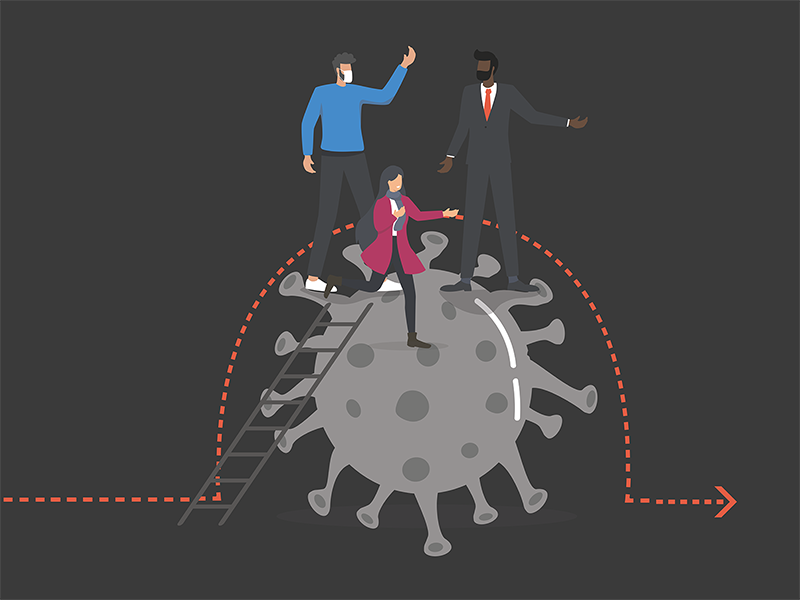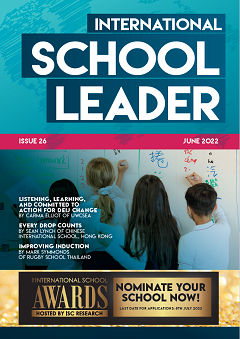By Angie Wigford
Many of us are finally living in the environment that we have been hoping for since around March 2020. This ‘new normal’ is a huge relief for some of us but we cannot ignore the impact of the pandemic. There is a desire to move forward and leave the past behind, and many students and teachers are more or less able to do this. However, a significant proportion of staff, students, parents and families continue to experience difficulties relating to the pandemic. There is much we can do if we take the initiative now.
A desire to move on
The new normal embodies the desire to make up for lost time. There is so much more to do: travelling on the weekends and over holidays, planning and going on school outings and trips. We find ourselves busy again, with our social schedules under pressure, and this can increase the normal stresses of international school life. Rekindling old friendships can be emotionally taxing and some people describe feeling that they have forgotten how to socialise. Walking into a room full of people after being used to meeting online can feel intimidating. For some, no longer being required to wear a mask can feel like a safety net has dropped, while others continue wearing them because they think they look better with a mask on. Many of our students in year 2 still wear a mask but only to school because that is part of the uniform for them. They have never known school without masks.
The desire to move forward and leave the past behind is strong, and to some extent demonstrates our resilience. Our wellbeing data at Dover Court International School (DCIS) indicated that not much had changed in terms of staff wellbeing before and after COVID with very similar positives and negatives evident in November 2019 and again in March 2022.
Supporting the need
Persistent difficulties are likely in all communities. However, if they are left without support, they can lead to long-term mental health problems: individuals and families isolating; social anxiety and school refusal; and young children showing difficulties with attachment. Many people continue to experience unresolved grief from being unable to go through the more normal bereavement process. Loss and readjustment caused by having to move are common, as is a dependence upon technology for entertainment and communication. Many students have significantly delayed basic academic and motor skills (particularly handwriting) as well as social and emotional communication difficulties. These can lead to a lack of confidence and self-concept and/or self-esteem issues that may not have arisen under different circumstances.
There are many questions about how best to support our communities in our new normal. Many aspects of our lives now may be very similar to pre-COVID times; however, we are all changed and that should not be ignored.
Suggestions for wellbeing development
Prioritise wellbeing: A gift of the pandemic has been an enhanced recognition of the centrality of psychological wellbeing to life in general. There is a risk that we don’t carry this over into our new normal and thereby miss out on a wonderful opportunity to make people’s lives better. From an ecosystemic perspective with our students at the centre we can develop approaches that recognise the value of developing our emotional vocabulary, talking about and expressing our emotions, learning to self-regulate and asking for help when we need to.
Focus on relationship development: Now you can invite families into school, work explicitly on positive and trusting family–school, staff–staff, staff–student and student–student relationships. Get to know your families. Make sure your students know each other. Make sure your staff knows each other. Develop respect as a key guide. A supportive community is a foundation on which individuals can find their niche and feel that they belong.
Apply relationship-based wellbeing: This is a good time to look around for informed approaches to guide wellbeing initiatives that are founded on relationship development. Sue Roffeys’ ASPIRE Principles provide such a structure:
- Agency – when people have agency they make their own decisions. Individuals and groups take responsibility for their choices. This is learning from the inside out – learning how to be and how to live well together.
- Safety – working with others in safe, respectful groups reduces anxiety about making mistakes and increases a sense of trust and confidence.
- Positivity – positive psychology, with its emphasis on wellbeing, resilience and flourishing has a powerful influence on both strengths-based and solution-focused approaches.
- Inclusion – occurs when people are regularly mixed up and the expectation is that they work with everyone. A sense of belonging is one of the most important factors in resilience.
- Respect – this means being accepted, listened to and not being judged unfairly.
- Equity – is being able to access the same opportunities (not being treated equally – different people need different supports) and having a voice.
Improve your support system: In general, money cannot buy wellbeing; however, enhancing the support systems in school can help a lot and money can finance the extra staff needed for this. Good curriculum enhancements around wellbeing, as well as introducing things like peer mentors for staff and students, can provide a buffer for strained counselling departments.
Everyone can take action: What can individuals do? Depending on your role in the system, taking responsibility at the individual, group (department/year group level) and whole school level is important. This can be done from many perspectives: provide a staff activity, join (or run) the staff wellbeing committee, develop curricula, rewrite policies, etc.
“We are all changed and that should not be ignored.”
Finally, time is the greatest healer. With the right approaches, schools can do a huge amount to support their staff, students and families so that they rebound stronger and more resilient from the trauma of COVID. Many schools have taken this on board wholeheartedly (see the article by Marlborough College, Malaysia in the June edition of IS Leader Magazine). Ignoring the need for this is missing a unique opportunity to build stronger individuals and an improved community.

Dr Angie Wigford is Educational Psychologist at Dover Court International School, Singapore. Connect with Angie on LinkedIn

